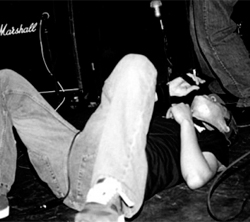 |
 |
 |
 |
| ::Interviews:: |
| review & interview content, as well as web site graphics & design, copywrite 2003-2004 Euphonia Online. use of materials granted only with reasonable purposes. |
 |
| interviewed by robby sumner |
 |
| Interview with Mike, Zach, and Lou September 1st, 2005 |
Rob - Vocals Mike - Guitar Zach - Bass Lou - Drums |
| E: So Life Before This, you've just recently released your first full-length for Rise Records. Was the album recording process something you feel the band has had a lot of experience in doing? Or was there a lot to learn upon you first entering?
Mike: We recorded this album entirely ourselves, and it was a pretty comfortable thing for us. I mean, obviously, anything you do that big... when you go back to it and listen to it for a couple months, you realize there are things you could have done better, but it's like that with anything. But I've been recording and producing for a real long time, and because of that, I kind of always like to get my chops worked up recording us, so we're constantly recording stuff. It was a real comfortable thing�we did it at one of our houses with my recording equipment� Zach: Lou's house. Mike: Yeah, Louie's house. It was a real relaxing, good, creative environment for us, so it was definitely a positive thing. We liked it a lot. E: Recording the album, did you feel like you already had a fanbase ready for it? Or were you expecting to have to build one after getting the record out? Zach: I think we're kind of starting from scratch. Lou: I believe there was a good amount of people who were waiting for it... whether or not it was close friends or not. *Laughs* Zach: *Laughs* Yeah, close friends or family. Lou: I guess there are just stepping stones to getting more fans and friends. Mike: We had a decent following in the local area, but the great thing about Rise is that they have distro through Victory, so the album is in stores from New York to LA, and we saw it as a good opportunity to expand our fanbase from where it was in this local area�because we've done a couple local releases, EP's and things like that, but we saw an opportunity to broaden it, you know? We really want to work our asses off and build a fanbase all across the country through touring and everything. E: So was the plan to build on the sound you'd already established with your local base? How much experimentation and reformation did you plan to do for the new material on this album? Mike: We experimented with it more... it's weird, and I know this is good in ways and maybe bad in ways, but we never really considered what we want to sound like or what people that like us are going to expect. I mean, we've had times where we've written a song or a part of a song, and it's like... "Wow, this is maybe a little bit different for us... I wonder if people will like it." But it feels good to us, which is kind of more of what we rely on. I think that what you're getting at is if we were trying to please our fans already... we weren't really, because we make music that we really like to make, and we'd love to have a following on that, rather than us write to please a group of people. Lou: I agree. Mike: Yeah, Lou agrees. Zach: So does Zach. I guess. *Laughs* E: The official random piece of trivia for your band is that your singer, Rob, is actually the cousin of Coheed & Cambria's singer, Claudio Sanchez. Do you treat this as simply an interesting novelty about your band, or do you expect for it to have any sort of impact on how bands perceive you? Zach: We hope that fans don't get some kind of preconception about us because of that relationship. We really love that band�we really like Coheed a lot, and we look up to them a lot, but we don't really try to sound like them, and we don't try to emulate them in any way. We have lots of respect for them, and we do view them as a good model for a good work ethic as a band... but musically, we're not really in the same ballpark, I wouldn't think. There's some definite similarities, but if fans are expecting us to sound like Coheed, they might be kind of disappointed. Mike: I'd also like to say that as far as advertising�how our band is introduced for people, we are smart enough to realize that telling everyone that, "Hey! We're Life Before This and our singer is Claudio Sanchez's cousin!" might help us sell some records, but in the long run, it wouldn't really be gratifying for us, because we don't know whether these people are buying our records because they like our music, or whether these people are buying our record because they love Coheed & Cambria. Zach: Yeah, definitely. Mike: We'd like to earn fans on our own merit, rather than based on that. Lou: And also, Coheed & Cambria didn't use one of their cousins to gain fans, you know? It just so happens. Zach: If we deserve success because of our music, we'll get it. That's not something we want to use as a crutch. E: Aside from collaborating instrumentally to create the music for your latest release, what other areas of the record's production did you take part in? How involved were you with, say, the album art or the track order? Or distribution strategies? Zach: We came up with the track order�we set up the tracks in a way that we thought they flowed well. But we didn't really have a hand in the artwork... we basically only had a veto. We were presented with artwork, and� Lou: �interrupting Zach... we're not the most artistic kids in terms of drawing, but we still have those ideas, you know, so we came up with ideas and presented them to drawers and artists, and they came back with something that we liked and that we used for the album. Mike: To touch on the artwork real quick... the artist is a good friend of ours. He's somebody who we met on tour and we got along with, so it's not like our record label was like, "Here's artist So-and-So, and he's going to do your artwork, and here it is, and this is how it's going out." We contracted this friend privately, and told him kind of what we were looking for, and he came up with something and we liked it, so we used it. As far as distro, we were asked, are there any specific cities we'd like our stuff put in, but beyond that, that's kind of something they decided. Sometimes with the advertisements, they'll go ahead and do stuff... but it's never anything that there's a possibility of us disagreeing with. The cool thing about Rise is that we do get a lot of control. All the production was done by us, with the exception of two tracks from the CD that were produced by Matt Squire, who's worked with the Receiving End of Sirens, Northstar... but he didn't produce the tracks specifically for the record. We had just done some work with him in the past, and we liked the way that he worked with those two particular songs, so we basically used those versions for the album. But it's not anything our label required. That's what I kind of think that we liked about Rise�it was very easy for us to get what we wanted to do out. We had our own control. E: Was the album written with specific tracks you thought should be highlighted as singles? Mike: I think that when we finished the album, it was pretty apparent to us which songs would be more of a single-type song. For example, the songs "Comfort in Numbers" or maybe "Red Hands." But I don't think we wrote them specifically to be singles... this is our first full-length, so we wrote some of those songs two years ago, and some of them we wrote pretty much as we were in the studio working on it, and I think that over those two years�like I said, we had the luxury of working with Matt Squire�we've seen how he thought as a producer, and we learned a lot about songwriting, and I think that the later songs we wrote, as far as format, are maybe a little more accessible. I think it's just become of how we've grown as musicians and songwriters through the course of the time that we were writing that album. Zach: But it wasn't intentional. Mike: Yeah, we weren't all, "Oh! We've got to sell out and write a single!" Zach: We weren't writing dope smashes. Mike: *Laughs* Lou: *Laughs* Yeah, I'm all about the ethics, so. E: Out of all the ways a band can be successful�with recording, performing live, booking shows, radio attention, all of that�what would you say is the most important to you? Lou: Playing shows. Mike: Yeah. I think the most important thing would be definitely playing good shows, having lots of kids there... because we're mainly a live band. That's what we do�play shows. Zach: And it's hard when not many people know about you, because when you're in an area that you're not really from�this goes back to working on a fanbase�usually the first time you come into town, you're lucky to have a handful of kids in the audience. But hopefully you leave some kind of impression, hopefully a positive impression, on them, so the next time you roll into town, you'll get a good number of kids. So I think playing shows is one thing that is important to us as far as bringing out more areas of success. It will definitely show in record sales and fanbase and all that. Mike: For us, we realize that the fundamental purpose of the music�it's music, we're musicians, and it's what we do. We play it live. And that's the thing we take the most seriously. That's not to say that we're not incredibly proud of our record�we think it represents us great. But to us, the most important thing to be able to do is to go out there and play your songs really well, and have a good time. And that's the best part of the experience for all of us. E: Well that should do it�thanks a lot, you guys. Mike: Great, thank you so much. |